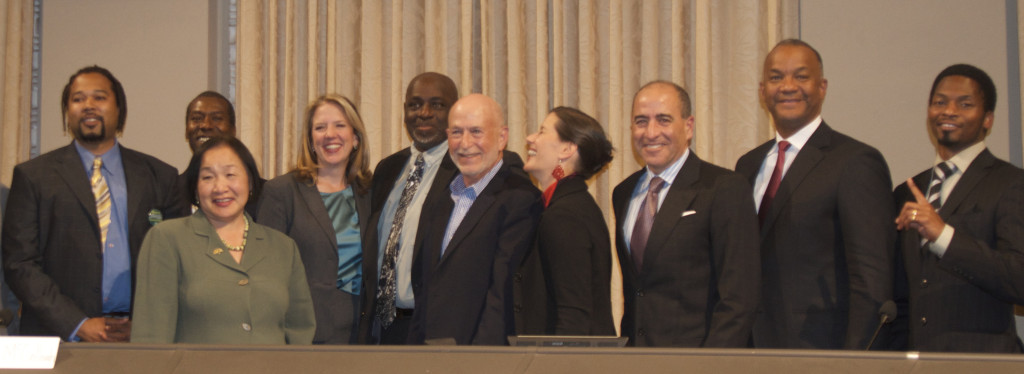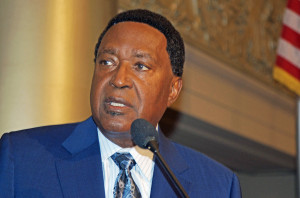Mayoral Candidates Address Black Issues
May 23, 2014

Mayoral candidates who spoke Wednesday night at the forum were: Jason Anderson, Patrick McCullough, Mayor Jean Quan, City Auditor Courtney Ruby, Sam Washington, Dan Siegel, City Councilmember Libby Schaaf, Joe Tuman, Port Commissioner Bryan Parker and Larry Lionel Young Jr. Photo by Ken Epstein.
By Ken A. Epstein
The contest to become the next mayor of Oakland began to get more serious this week, as 10 candidates for the job faced some tough questions at the 100 Black Men of the Bay Area’s mayoral debate.
Speaking at a packed meeting in Oakland City Hall chambers Wednesday evening, the candidates answered questions from representatives of African American organizations.
An immediate challenge confronting the candidates is to distinguish themselves from each other and from incumbent Jean Quan, who is standing on what she considers to be her accomplishments – creating affording housing, reducing violent crime and bringing economic development to the city.
City Auditor Courtney Ruby was asked a question about what she would do as mayor if there were a recurrence of a situation where Oakland’s Workforce Investment Board (WIB) administrators failed to utilize funds and therefore had to send back $650,000 to the state for job training for unemployed Oaklanders.
“This is absolutely unacceptable in our community – we need to be able to track every dollar that’s coming in,” said Ruby, who at the time did not use her elected position to investigate why the city lost the money.
“The Workforce Investment Board is a total travesty in my opinion,” said civil rights attorney Dan Siegel. “It sucks up too much of the job funds. The administration should be cut,” he said adding that anyone who gives back funds should be fired.

“It’s atrocious, but its goes beyond that. Oakland needs to put some skin in the game,” said Councilmember Libby Schaaf, pointing out that Oakland uses a significant part of its federal Workforce Investment Act funding for overhead rather than kicking in additional money for on-the-ground services.
The panel of questioners included Kimberley Mayfield Lynch of the Oakland Berkeley Chapter of Black Women Organized for Political Action (BWOPA), Merlin Edwards of the Oakland African American Chamber of Commerce, Diane Lewis of 100 Black Women, Pastor Gerald Agee of Pastors of Oakland and Paul Cobb publisher of the Post and El Mundo newspapers.
Civil rights attorney John Burris moderated the debate and asked some questions. Leaders of 100 Black Men of the Bay Area Frank Tucker and Derrick Bulls hosted the forum.
Celebrating the huge Oakland Army Base development that broke ground under her administration, Mayor Quan said the project is reaching the city’s 50 percent local hiring goal. But finding people to fill these jobs is tough, she said, adding that she has to do outreach to churches to recruit workers.
However, according to the West Oakland Job Resource Center, there is a waiting list of construction workers seeking employment at the Army Base project.
Post publisher Cobb chimed in, saying that Quan was reluctant to advertise her message in the Black and Brown media. All the other candidates then said if they were mayor, they would enthusiastically advertise in the Black press to reach the voters who attendthe city’s more than 500 Black houses of worship.
With the new development coming into the city, “We have to be sure people are not left behind,” said Quan, citing figures that place unemployment of 18-25 year olds at 35 percent in East Oakland and only 4 percent in Montclair.
Addressing the hot button issue of public safety, the candidates pledged to contribute resources to reduce recidivism and help unemployed and out-of-school youth.
Several candidates pledged to dramatically increase the number of police officers to 800 or more, though they did not say how they would pay for them.
Oakland had 654 sworn police officers as of the beginning of May, and public safety already consumes about 50 percent of the city’s annual budget. Potential new officers are currently attending a Police Academy at a cost of about $4 million.
“The minimum is 900 (officers),” said candidate Joe Tuman,
Bearing down on public safety, Port Commissioner Bryan Parker asked, “Do you feel safer than you did four years ago? People do not feel safe at home, at work and walking round in the streets. “
“We need a safe, educated, economically healthy Oakland,” he said.
Ruby ended her remarks with a call to action. “Imagine what we could do if we had City Hall on our side.”
Quan emphasized the progress that OPD has made during her administration. “Our police force is the most diverse (it has been) and more effective than it has been in more than a decade,” she said.
Candidates also opposed gentrification, comparing Oakland’s potential future to the negative example of the forcing out of African American and Latino residents of San Francisco.
The people who are forced to move out, said Tuman, are the most vulnerable residents with limited “social and economic capital.”
Siegel said he would work with organizations like Urban Strategies Council to use up to 1,200 acres of existing public land to build affordable housing for 5,000 Oakland residents. He also was interrupted with applause when he said he would help establish a minimum wage of $15 an hour and create an Oakland Bank to help with housing affordability issues.
The answer, said Parker, is training and better paying jobs for Oakland residents.
Other candidates who spoke at the forum were Jason Anderson, endorsed by the Green Party; Patrick McCullough; Sam Washington, business and technology solutions strategist; and Larry Lionel Young Jr., past candidate for City Council, District 3, and for mayor in 2010.
Anderson was warmly received over his plans on how to purchase and preserve historic housing in the Black community, such as the Marcus Garvey Building.
Publisher Cobb said, “Based upon the candidates’ answers, I’d say the forum attendees’ ranked choices would be Siegel, Parker and Schaaf. But Anderson is coming on strong.”